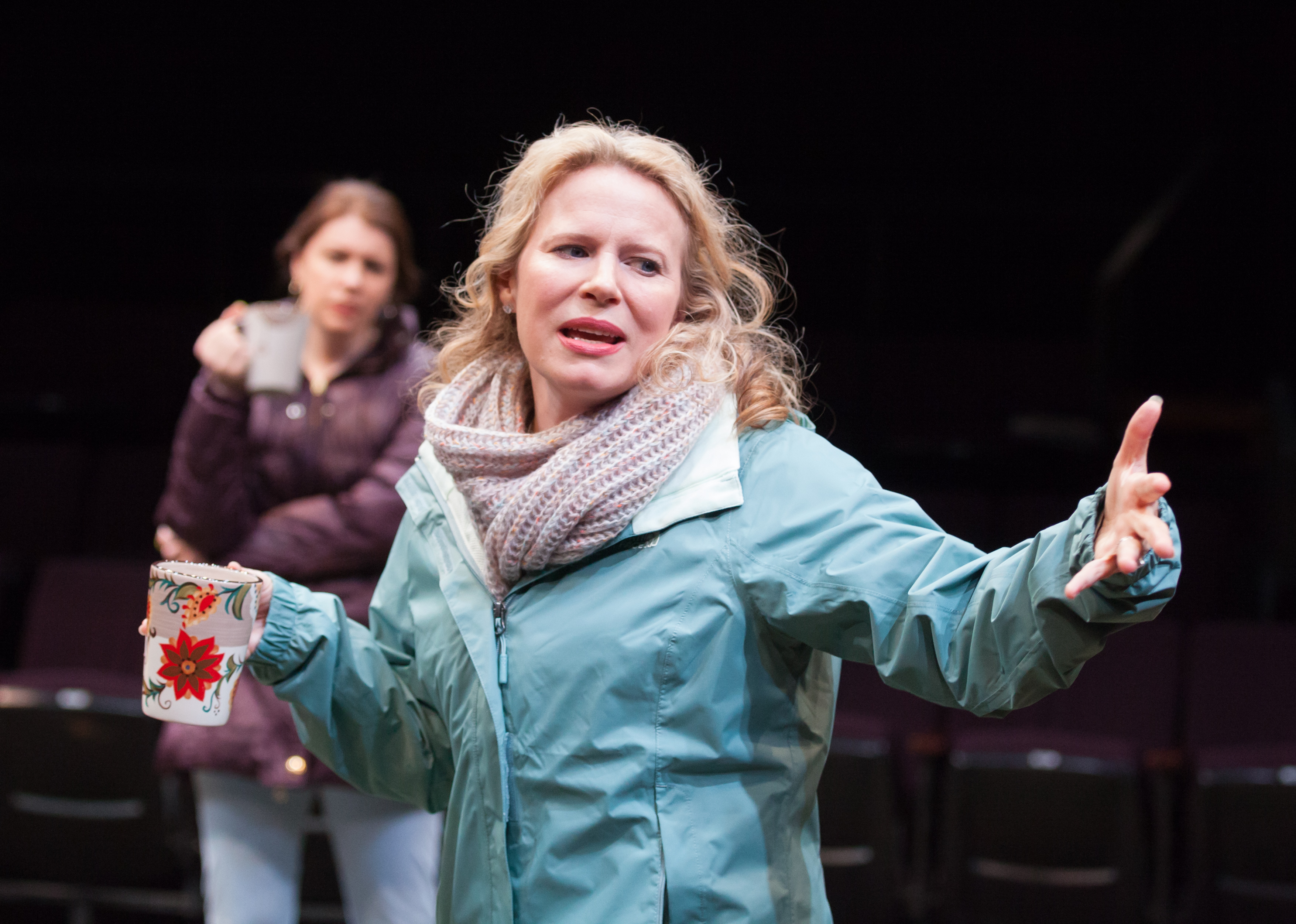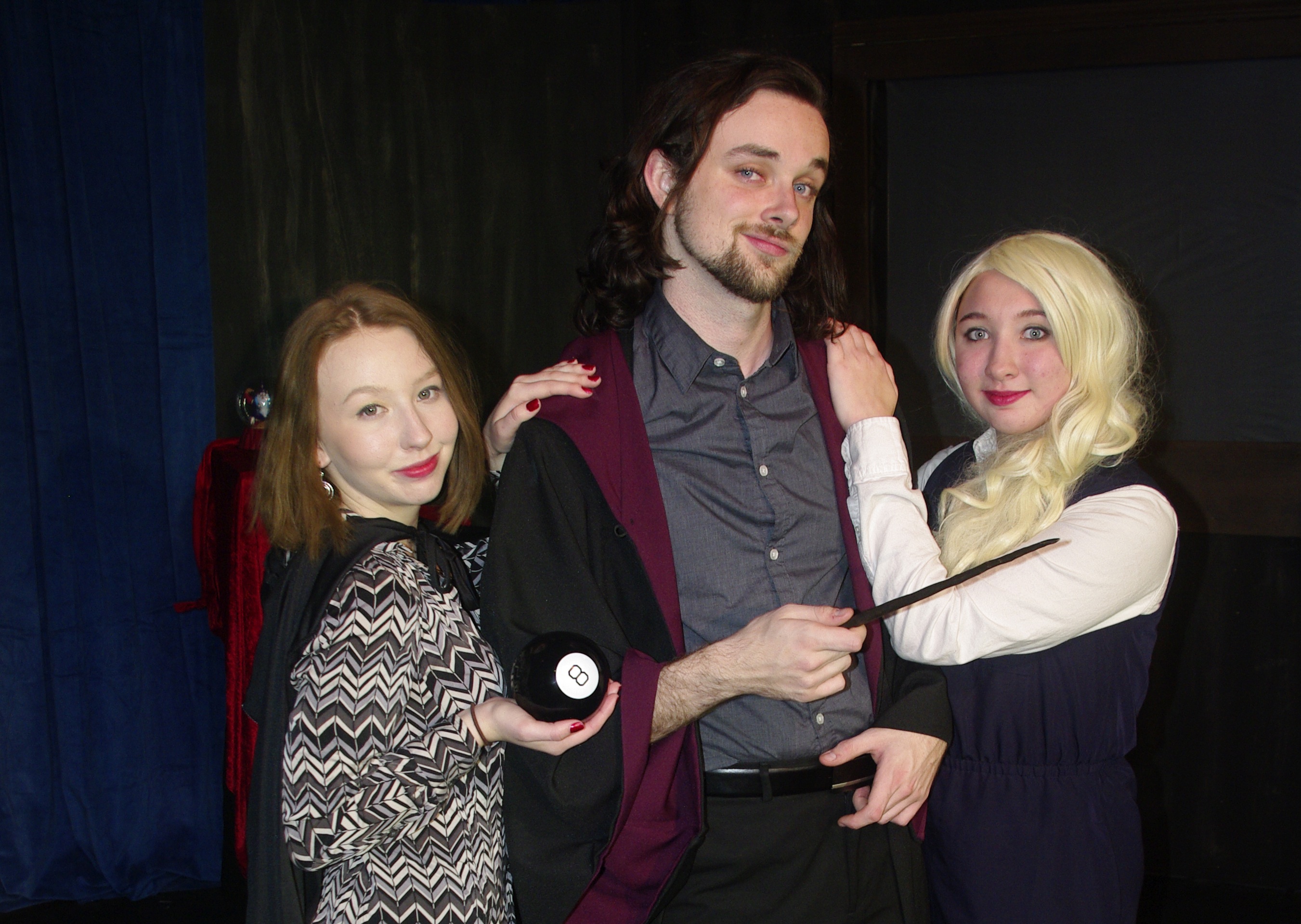Andrea Syglowski and Jessica Dickey in Cry It Out. Photo by Bill Brymer.
Cry It Out
By Molly Smith Metzler
Directed by Davis McCallum
Review by Allie Keel
Entire contents copyright © 2017 by Allie Keel. All rights reserved.
Actors Theatre’s 41st Humana Festival is in full swing, with its third offering, Molly Smith Metzler’s Cry It Out.
Directed by Davis McCallum, the play focuses on several new mothers and one new father as they deal with their drastically changed lives.
While motherhood is the driving force of the play, the work also takes a deep dive into modern class structures, and how drastically money affects one’s experience of parenthood.
At the play’s center is the friendship between Jessie (Jessica Dickey), and Lina (Andrea Syglowski), whose backyards butt up against each other, both new mothers. The play starts with a long, slow scene between the two – their first meeting, which grounds the rest of the play in a strong sense of emotional honesty, and a gentle pace.
In that first scene we see the two women’s desperate need for connection, each one feeling marooned by motherhood, cut off from adult contact for much of the day. They love their kids, but they crave grown up friendship.
Jessie is a high powered Manhattan attorney, and although the early revelations of her relative wealth suggested she’d be the clueless rich person in the class struggle, she is instead a continuously sweet and caring presence which the other characters bounce off, and lean on, for support.
Dickey imbues Jessie with the right maternal air. She’s at an even keel for much of the piece, and while her single eventual blow up is still pretty low key, it still serves to give her character a solid arc.
Syglowski gets to be a little more fiery with Lina, a Jersey girl with a rough past and home life, marked by poverty and addiction. She drives a lot of the comedy in the scenes with Jessie, who is in turns shocked and amused by her neighbor’s rough tongue and outlook.
Audience members with an eye for detail can see the class distinction played out perfectly in the dividing line between the two women’s yards. Scenic designer William Bowles deserves a shout out for the most amazing faux crappy lawn I’ve ever seen, complete with muddy bald patches and dog shit. It’s worth taking an extra look at after the show is over.
From the beginning of the play a time limit is put on Jesse and Lina’s new friendship, as the end of maternity leave looms for them both. Lina will certainly have to go back to work, but Jessie thinks she and her husband can afford for her to stay home.
The end of maternity leave injects what little stakes this play has, while keeping the themes of motherhood and economic disparity on the front burner. It’s a subject that could have gotten political and preachy at the expense of the characters, but Metzler wisely chooses to let the reality of the situation speak for itself.
Jessie and Lina’s friendship is interrupted when Mitchell (Jeff Biehl) appears one day and asks if his wife can join the duo’s frequent backyard meetings. He is their neighbor of sorts, living in the lavish home at the edge of a nearby cliff that overlooks Lina and Jessie’s backyards. Shortly thereafter we meet Adrienne (Liv Rooth), who has her own struggles with being a new mother.
Mitchell and Adrienne are much wealthier than Jessie or Lina, which allows the class discussion to take on quite a bit more depth. Having three points makes the discussion a triangulation rather than a simple measurement of the distance between two points on a line.
McCallum’s script is strong but slow. She doesn’t feel the need to push her characters or add any more drama than is necessary. These are normal people in a fairly normal circumstance; it just so happens to be a circumstance –parenthood – that completely changes their lives.
The comedy in the script, of which there is plenty, works better when it sticks to the odd couple aspects of Lina and Jesse’s relationship. It’s less successful when it frequently veers into pop culture references. While that sort of humor is good for a quick laugh, it gives the play a shorter shelf life, and didn’t add to the characters in the way that the more idiosyncratic explorations did.
The script deserves praise for an honest look at a facet of life that is often left out of drama, or painted from behind a sort of mythological screen. The highs and lows of new parenthood are often treated as a kind of epic heroe’s journey, and McCullum allows the real drama to peek through the veil in a way that is much more quiet, but, as a result, carries a lot more weight.
Cry It Out
March 10 – April 9, 2017
Part of the 41st Humana Festival of New American Plays
Actors Theatre of Louisville
316 West Main Street
Louisville, Kentucky 40202
502- 584-1205
Actorstheatre.org
Allie Keel is a Louisville based playwright, poet, storyteller, and freelance journalist. They have been published in Word Hotel, their plays have been produced by Theatre [502] and Derby City Playwrights, and they were invited to read their work at the 2014 Writer’s Block. They are frequent contributor to LEO Weekly and Insider Louisville, where they have been given the (informal) title of “Chief of the Bureau of Quirk.”





